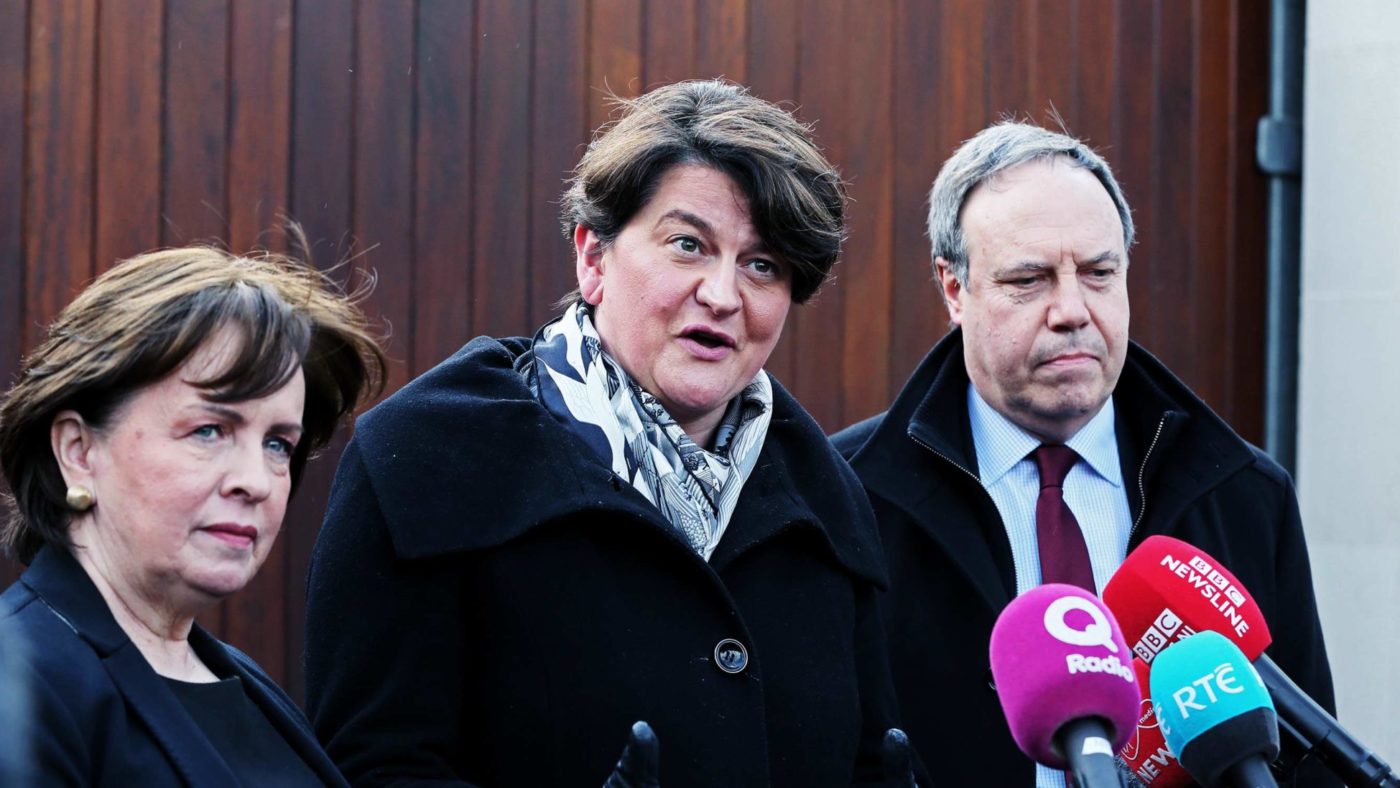If it’s tricky to keep up with the detail of endless debates over Brexit, shifting alliances in the House of Commons make the task even more difficult. Last night, a new contour emerged in the parliamentary landscape, as the DUP supported the Prime Minister, while its Conservative Brexiteer allies helped inflict another serious defeat on the government.
MPs voted on a motion endorsing Theresa May’s current negotiating strategy, designed to win her more time to broker changes to the Northern Ireland backstop. Members of the Tory European Research Group (ERG) abstained while the DUP backed the government, claiming that the party is still “focused on securing legally binding changes to the draft Withdrawal Agreement as agreed by the House through the Brady amendment.”
In contrast, the ERG said that it couldn’t support the motion, because it implied ruling out a ‘no deal’ Brexit. The wording required MPs to reiterate their backing of a previous series of votes, one of which included a cross-party amendment that rejected leaving the EU without an agreement.
The DUP’s decision not to abstain reflects the softer tone that some of its representatives have adopted recently, in their statements about the backstop. Its fiercest Brexiteer MP, Sammy Wilson, still insists that the Northern Ireland protocol must be scrapped completely, but other senior figures, including Arlene Foster, are prepared to accept changes or assurances, so long as they are binding.
It’s an interesting difference in approach, which may prove significant in the weeks ahead.
The DUP is still in a confidence and supply arrangement with the Conservatives and, in theory, it would be expected on most occasions to support the Government. Yet, its position on Brexit has been much closer to the Tory ‘rebels’ in the ERG in recent votes.
So what has caused this new difference of opinion? Firstly, it may simply reflect the fact that the DUP’s opposition to the draft agreement is based more genuinely on its difficulties with the Irish backstop. The party has expressed deep misgivings about an ‘insurance policy’ that threatens to create an Irish Sea border between Northern Ireland and the rest of the UK.
The ERG has focussed on the backstop too, but some cynics suggest that it is a useful pretext to press for the looser trade deal that its members favour or even to make ‘no deal’ the most likely outcome. There has been speculation that, even if the Government secured meaningful changes to the protocol, it may not be enough to persuade ardent Brexiteers to support the draft Withdrawal Agreement.
Equally, a WTO Brexit does seem, at least, a useful lever for the government in negotiations. As the 29th of March gets closer, a spotlight has been cast on the likely consequences of ‘no deal’ for Germany, France, the Republic of Ireland and elsewhere in the EU.
Meanwhile, the Prime Minister’s commitment to negotiate “alternative arrangements” to the backstop looks thoroughly half-hearted. During a recent speech in Belfast, she insisted that she wants changes to the protocol rather than its removal from the deal. Earlier this week her chief negotiator, Olly Robbins, reportedly described the backstop as a ‘bridge’ to an agreement rather than a ‘safety net’ and his comments make it seem like the Government is seeking only cosmetic alterations to the text.
An ITV report suggested that Robbins wants the document changed so that the backstop is described as “necessary subject to a future trade deal” rather than saying it must “maintain the necessary conditions” for North-South cooperation under the Good Friday Agreement. It’s difficult to see how that revision addresses unionists’ concerns that the EU could force Northern Ireland into separate arrangements by exercising its veto in future talks, with the result that the province would be trapped in a different customs and regulatory regime from the rest of the UK.
The alternative explanation for the division between the DUP and the ERG is that the Northern Irish party is looking for an excuse to support Theresa May’s draft agreement and it will back down if the Prime Minister can win a concession from Brussels that it can plausibly present as a victory. This theory relies on the idea that it is worried by the prospect of ‘no deal’ and that it takes seriously government ministers’ threats of a ‘border poll’ on Northern Ireland’s constitutional future.
Admittedly, there has always been an element in the DUP whose commitment to UK-wide politics is highly conditional. Based on some of its previous behaviour, it’s not difficult to imagine the party accepting profound differences between Northern Ireland and Great Britain, if it felt that there were sufficient financial or other rewards available for endorsing a deal.
For the integrity of the United Kingdom, it’s exceptionally dangerous that Ulster continues to be the highest profile obstacle to an acceptable, though far from perfect, agreement.
It’s entirely understandable if politicians and the public are suffering ‘backstop fatigue’, but the EU’s demand to effectively take control of part of the country are simply too extraordinary to accept. The Government, its MPs and its DUP supporters should certainly consider creative ways of getting around this impasse, but only if the EU’s threat to divide Northern Ireland economically and politically from the rest of the UK is lifted.
CapX depends on the generosity of its readers. If you value what we do, please consider making a donation.


